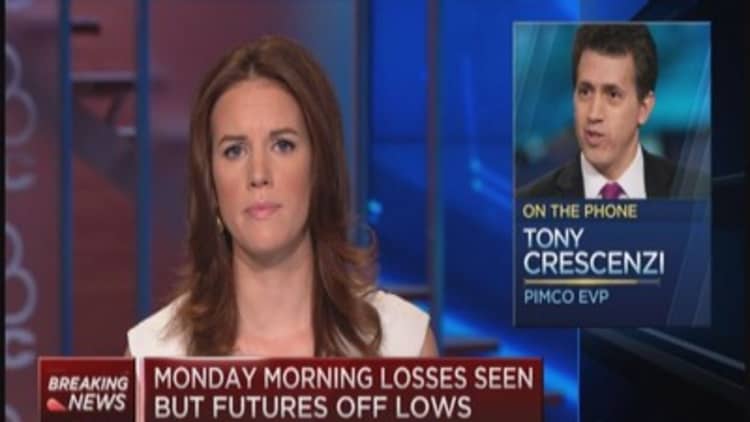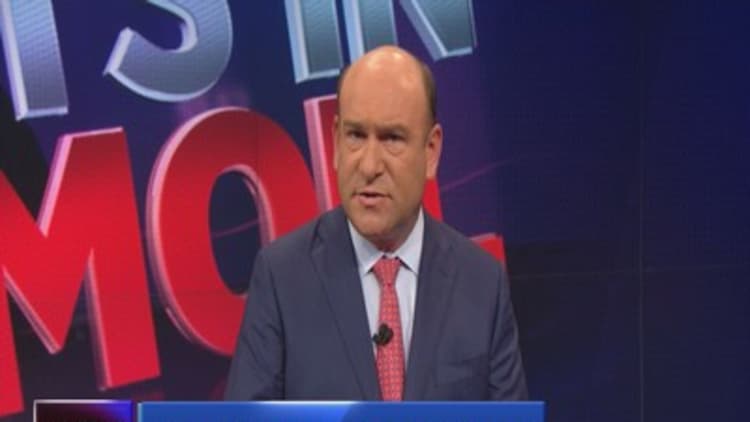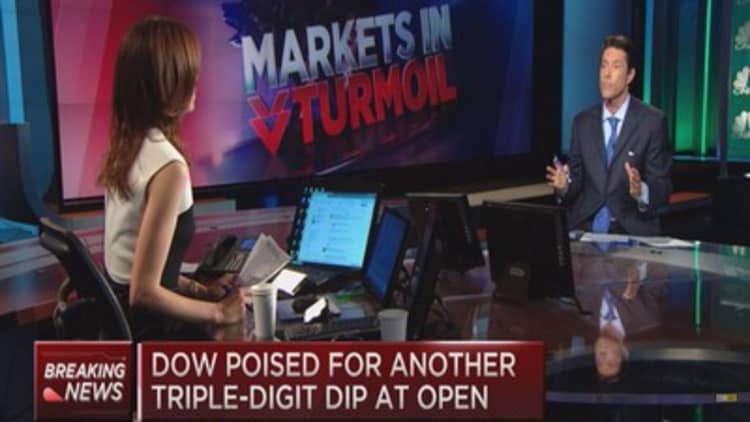









While many investors remain frightful as the broader markets continue to sell off, PIMCO's Tony Crescenzi, said Sunday he sees this as an opportunity.
"We would take advantage of this weakness. Consider how the interest rates will be three to five years from now," Crescenzi said. "Rates are likely going to be extremely low to historical standards, so global institutional investors will be pouncing on this opportunity.
Investors across the globe struggled to find direction, with U.S. futures trading down about 1 percent across the board after Wall Street recorded its worst trading day since 2011 and with Japan's Nikkei 225 falling about 2 percent.
"We expect further action from China and we expect further action from other central banks," Crescenzi told CNBC. "When one thinks about China and its recent devaluation of its currency, one has to also think about the actions of other central banks and what they might do."
"What ultimately will happen is, we expect further actions by ...China to stimulate its economy and net-net-net, it could turn out a positive," Crescenzi added.
Read More
Still, Mohamed El-Erian, chef economic adviser at Allianz, said investors will be in for a rough ride moving forward, as this current selloff is not over yet.
"We haven't seen one of two things that we need. Either we need better economic news to calm concerns about an accelerating global slowdown, or some policy intervention, not from the ECB or the Fed ... but that holds in the emerging world," El-Erian told CNBC on Sunday.
He added that, without any of these elements, emerging market economies would have a hard time pulling themselves out of the hole since oil prices keep falling.
U.S. oil prices were down about 2 percent and briefly dipped below $40 a barrel.
"The emerging world is being hit in two ways: one is a demand shock and two is in terms of trade shock. They are commodity exporters and commodities have come down," El-Erian said.
"This is very different from the selloffs we've seen before. The selloffs we've seen before were either because of a taper tantrum in the U.S., or because of concerns about Europe," El-Erian added. "This time, the contagion is coming from somewhere else."
Read More Stock bulls sidelined while markets shake out
Nevertheless, sentiment around the oil space is growing grimmer, said Michael Block, chief strategist at Rhino Trading Partners.
"I can't find anyone who likes crude right now, and that's the best thing I can say about it," Block said. "This sounds like March, but even worse."
In fact, as oil prices continued to hover around the $40 mark, Andy Lipow, president of Lipow Oil Associates, said the next key level for U.S. crude would be at around $34 a barrel.
"If we hit that, that's a buying opportunity," Lipow said. "We didn't stay around $34 a barrel very long in 2008-2009 [and] we were $10 higher a month later and we had hit $100 a barrel by December 2010."
What slower China growth means
"We have to put this into a broader perspective," said Chad Morganlander, portfolio manager at Stifel. "With the China story, you're getting a reset of global growth expectations and in particular in China. Over the last 14 years, China has grown in excess of over 300 percent. That has had majors distortions on the commodities complex."
The broad selling has also led many, including Morganlander and Diane Swonk of Mesirow Financial, to believe that the Federal Reserve may have to hold off on raising interest rates.
Read More Tell CNBC: What are you buying and selling Monday?
"At this point in time, they can't do it," Mesirow's chief economist said. "It's insult to injury. You can't do that with instability in the markets."
Swonk added that she believes a more likely date for the central bank to normalize monetary policy would be December.
"This is a unique crisis, in that you're now talking about the second-largest economy in China, hitting their middle class ... but I think we'll make it through this," she said.


